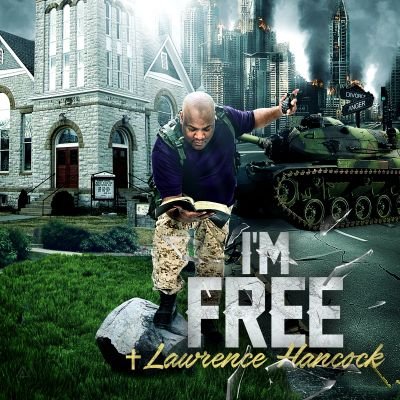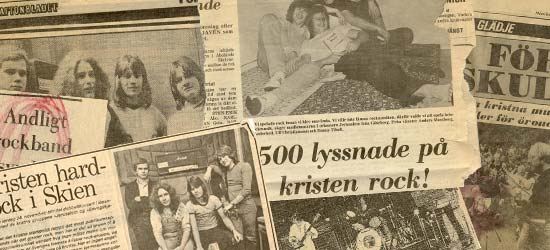|
||||||||||||||||||||||||||||||||||||||||||||||||||||||||||||||||||||||||||||||||||||||||||||||||||||||||||||||||||||||||||||||||||||
I'm Free
New Album by Bishop Lawrence Hancock
Available March 30, 2018
Sneak Peak Available on EWCMI Online Radio on Tuesday March 20, 2018 of the soon to be new Hit Single "I'm still here"
 Lawrence has compiled a 10-track album that is loaded with variety utilizing Gospel, Retro-Soul, and Hip-Hop themes.
Lawrence has compiled a 10-track album that is loaded with variety utilizing Gospel, Retro-Soul, and Hip-Hop themes.
His hit singles, “I'm Still Here" and “I'm Free,” are effectively impacting global radio. The Quartet feeling “Touch Me Again,” featuring Nikki D & Gloria Brown,
is on deck as the next Single with early radio reviews generating enthusiasm.
Teaming up with BET's 106 & Park Freestyle Rap Champion B. Wills on “Incredible” and arguably the most effective Christian Hip-Hop Song to usher corporate worship “Perfect Timing, Hancock demonstrates his composition and producer skills that will impact Millennials. Bishop didn’t forget about Sunday Morning on the hand clapping/head bobbing “Can't Live,” a Choir Director's dream. Along the way, this Album gives
listeners stops in several styles of Urban Christian Music making it truly a musical journey.
“When people put on this album, I want them to go from 1-10, and say I need to hear that again," Hancock says. "I want them to hear the music and know it’s it about what sounds good or what you can hum to, but know the music came from my relationship with God and my experiences now that I'm Free."
Bishop Lawrence Hancock, from the shadows of Detroit, MI is one who is a Servant-Leader in Toledo, Ohio who utilizes his gifts and talents refined at the DePaul University (Chicago, IL) and Berklee College of Music (Boston, MA) as the senior leader of the Final Harvest Church. God trusts Hancock to balance being a Pastor and an Artist...he knows which comes first...through life’s challenges...declaring to be free indeed!
I’m Free is available for Download on iTunes, Amazon, and Google Play and other Digital Outlets on March 30, 2018! All Digital Download proceeds will be granted to the Final Harvest Church Building Fund! The project will also be available on Tidal, iHeart Radio, and Spotify and of course you will hear this great annointed music on EWCMI Online Radio.
Arise & Shine
Thanks to a message from Brackin Kirkland who together with his wife Lindsay form Sounds Like Reign ( oh of course and their kids on the backing vocals) we came in contact with Teyo Lee who not to long ago released his first album "Arise & Shine".
Teyo has a great and wonderful testimony and the songs are pure and straight from the heart.
The Album is a great Joy to listen too and we are happy that the Music of Teyo is now played on EWCMI Online Radio.
| Track | Title | Duration |  |
| 01 | Take Courage | 0:03:57 | |
| 02 | Isaiah 40 | 0:03:05 | |
| 03 | Fruit of the Spirit | 0:04:39 | |
| 04 | Every Bridge Burning | 0:03:41 | |
| 05 | His Name Is Wonderful | 0:03:32 | |
| 06 | Arise and Shine | 0:03:48 | |
| 07 | Journey | 0:04:41 | |
| 08 | Hold Fast | 0:03:50 |
The songs on "The Great I am" have been written over many years, and many miles of travelling by foot, bike and bus on the highways and byways - in search of a King and His great Kingdom.
Many years ago when the Lord revealed Himself to me in my brokenness, I knew there was only One Way, Truth, and Life - and that is through His Son Yeshua (Jesus).
As a result of His love and mercy, I live to honor and serve Him with all my heart, soul, strength...and now with these songs!
Shalom,
Teyo
LAWRENCE HANCOCK IS BACK WITH 5TH STUDIO ALBUM
"NOTHINGS TOO HARD" 
NOTHINGS TO HARD (Symphonic Dist.) is the fifth Album from Urban Christian Artist Lawrence Hancock. This masterpiece comes on the heels of back-to-back Billboard Gospel Album Sales Charting projects. These 12 Singles give music enthusiasts what they have been asking for...a complete album! Utilizing a pallet of urban musical themes, Hancock continues to captivate with Christ-centered lyrics that evoke the listener to praise and worship.
The Title Track, “Nothings Too Hard,” examines the heart and releases a hope for all to believe God will! A compelling vintage tune “Make It Right” creates the Sunday Morning experience anywhere…dubbed an instant classic! This chorale arrangement welcomes Detroit’s own Latisha Austin, Ulanda Phillips, Kierra Scott, Will Gary, Lawanda Ingram, Katherine Walker, and Lakesha Walker. This down-home number gives the listener a familiar sound, but “wait for it!”
Starting the project with composing 30 tracks, Lawrence recorded 25 of those songs…12 made it! “Each of the final 12 songs were given a 5 second heat check! If the track didn’t capture me in that time, it was cut…as the teenagers say…Periodt!”
-Bishop Edgar L. Vann, Second Ebenezer Church,
Detroit, Michigan
Hancock’s inspiration continues to flow from reflecting upon decades of Salvation. “I spent a lot of time with the pen thinking about how I got here. How to share my experiences with the listener. Challenging myself to go beyond the beats and hooks to a place where the music touches souls...”
“Let ‘Em Shine is a catchy, foot tapping, head bobbing anthem of praise draped in Caribbean infused rhythms matched with a magnetic chorus. Let Em Shine is carefully constructed with nicely placed instrumentation, superb lyrics, vocals and, keyboard and bass/guitar chords. Let Em Shine is an intense and joyful listening experience that will quickly become a listener favorite.”
-Shed Jackson, Communications and Marketing Director
Jazz 91.9 WCLK Atlanta, GA
Nothings Too Hard is Available for Order on Amazon, Google Play, and iTunes. The album will stream on Tidal, Pandora, Spotify, iHeartRadio and other major streaming services globally.
All Digital Download proceeds go to the Final Harvest Church Building Fund!
!!!! For The Whole Month Of September !!!!
Every Tuesday on the hour after the news, Never Change Up, the new hit single by Bishop Hancock.
Programming Schedule for the Holiday Season
| Show times | Sunday | Monday | Tuesday | Wednesday | Thursday | Friday | Saturday | Show times |
| 12:00 AM | Weekend Christmas Music | Weekday Christmas Music | Weekend Christmas Music | 12:00 AM | ||||
| 01:00 AM | 01:00 AM | |||||||
| 02:00 AM | Sheep Laughs (Christian Comedy) | 02:00 AM | ||||||
| 03:00 AM | Weekday Christmas Music | 03:00 AM | ||||||
| 04:00 AM | 04:00 AM | |||||||
| 05:00 AM | Christmas Old Time Radio Show | 05:00 AM | ||||||
| 06:00 AM | Weekend Christmas Music | Weekday Christmas Music | Weekend Christmas Music | 06:00 AM | ||||
| 07:00 AM | 07:00 AM | |||||||
| 08:00 AM | Theology at Christmas | 08:00 AM | ||||||
| 09:00 AM | Weekend Christmas Music | Weekday Christmas Music | Weekend Christmas Music | 09:00 AM | ||||
| 10:00 AM | Sunday Service @ 10 | 10:00 AM | ||||||
| 11:00 AM | Sermonette (Short Message from the greatest teachers) | 11:00 AM | ||||||
| 12:00 PM | Weekend Christmas Music | Weekday Christmas Music | 12:00 PM | |||||
| 01:00 PM | 01:00 PM | |||||||
| 02:00 PM | Sheep Laughs (Christian Comedy) | 02:00 PM | ||||||
| 03:00 PM | Weekday Christmas Music | 03:00 PM | ||||||
| 04:00 PM | 04:00 PM | |||||||
| 05:00 PM | 05:00 PM | |||||||
| 06:00 PM | Sunday Service @ 18 | Christmas Old Time Radio Show | Weekend Christmas Music | 06:00 PM | ||||
| 07:00 PM | Weekday Christmas Music | 07:00 PM | ||||||
| 08:00 PM | Weekend Christmas Music | 08:00 PM | ||||||
| 09:00 PM | Christmas Old Time Radio Show | Weekday Christmas Music | Christmas Old Time Radio Show | 09:00 PM | ||||
| 10:00 PM | Weekend Christmas Music | Weekday Christmas Music | Weekend Christmas Music | 10:00 PM | ||||
| 11:00 PM | 11:00 PM | |||||||
| 12:00 AM | Midnight | 12:00 AM | ||||||
Programming Schedule
Items within this programming schedule will link to the associated program page.
More Articles …
Subcategories
Podcasts
Musician-Group-Pastor
Included are Artists, Groups or Ministry Contributors
Radio Front Page
The articles heading the Radio Front Page
Page 4 of 4










